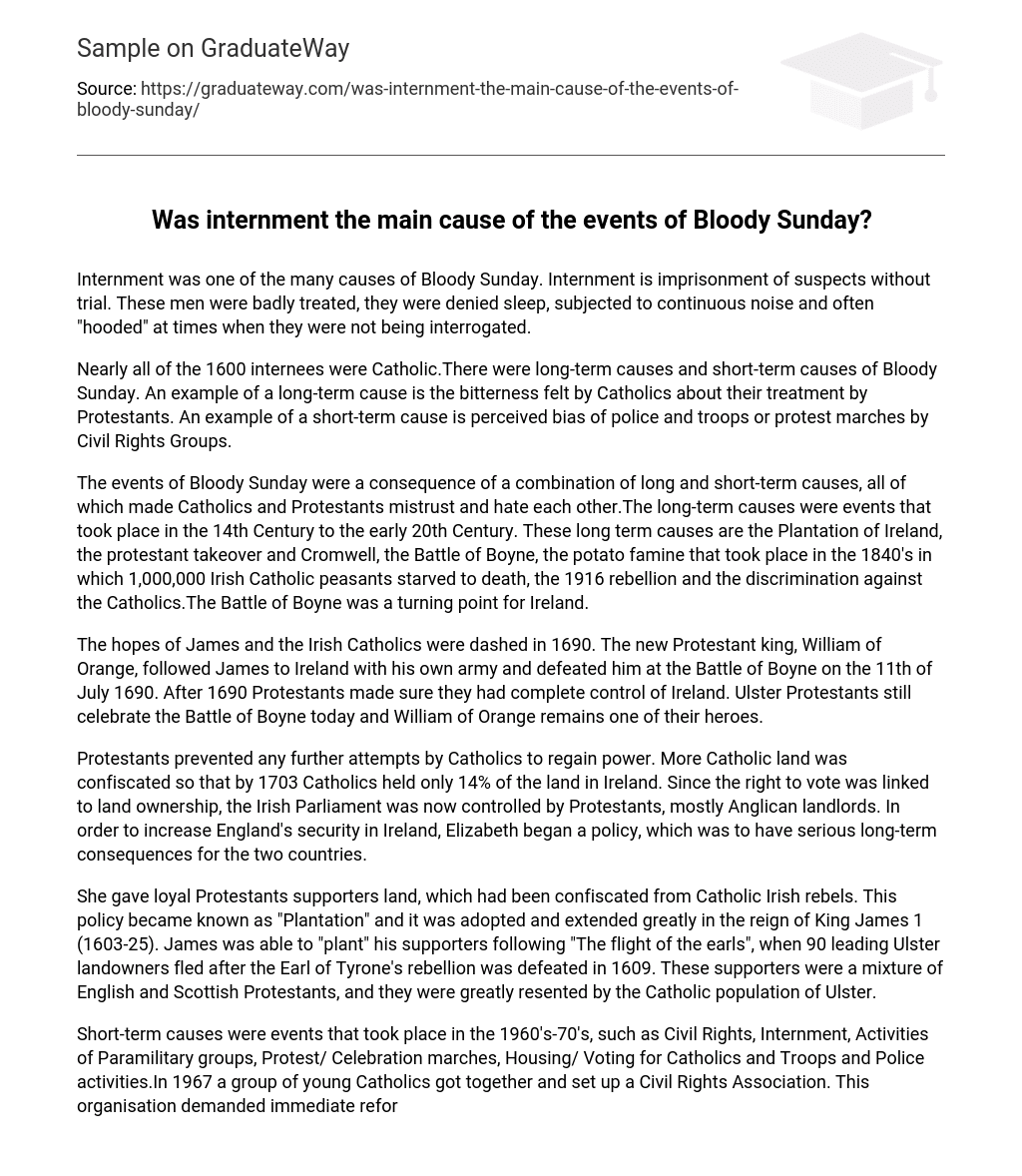Internment was one of the many causes of Bloody Sunday. Internment is imprisonment of suspects without trial. These men were badly treated, they were denied sleep, subjected to continuous noise and often “hooded” at times when they were not being interrogated.
Nearly all of the 1600 internees were Catholic.There were long-term causes and short-term causes of Bloody Sunday. An example of a long-term cause is the bitterness felt by Catholics about their treatment by Protestants. An example of a short-term cause is perceived bias of police and troops or protest marches by Civil Rights Groups.
The events of Bloody Sunday were a consequence of a combination of long and short-term causes, all of which made Catholics and Protestants mistrust and hate each other.The long-term causes were events that took place in the 14th Century to the early 20th Century. These long term causes are the Plantation of Ireland, the protestant takeover and Cromwell, the Battle of Boyne, the potato famine that took place in the 1840’s in which 1,000,000 Irish Catholic peasants starved to death, the 1916 rebellion and the discrimination against the Catholics.The Battle of Boyne was a turning point for Ireland.
The hopes of James and the Irish Catholics were dashed in 1690. The new Protestant king, William of Orange, followed James to Ireland with his own army and defeated him at the Battle of Boyne on the 11th of July 1690. After 1690 Protestants made sure they had complete control of Ireland. Ulster Protestants still celebrate the Battle of Boyne today and William of Orange remains one of their heroes.
Protestants prevented any further attempts by Catholics to regain power. More Catholic land was confiscated so that by 1703 Catholics held only 14% of the land in Ireland. Since the right to vote was linked to land ownership, the Irish Parliament was now controlled by Protestants, mostly Anglican landlords. In order to increase England’s security in Ireland, Elizabeth began a policy, which was to have serious long-term consequences for the two countries.
She gave loyal Protestants supporters land, which had been confiscated from Catholic Irish rebels. This policy became known as “Plantation” and it was adopted and extended greatly in the reign of King James 1 (1603-25). James was able to “plant” his supporters following “The flight of the earls”, when 90 leading Ulster landowners fled after the Earl of Tyrone’s rebellion was defeated in 1609. These supporters were a mixture of English and Scottish Protestants, and they were greatly resented by the Catholic population of Ulster.
Short-term causes were events that took place in the 1960’s-70’s, such as Civil Rights, Internment, Activities of Paramilitary groups, Protest/ Celebration marches, Housing/ Voting for Catholics and Troops and Police activities.In 1967 a group of young Catholics got together and set up a Civil Rights Association. This organisation demanded immediate reforms in the way Northern Ireland was run. From October 1968, they organised a series of protest marches.
These marches ended in violence and bloodshed between Catholics and Protestants. Civil Rights marches were opposed by followers of the Protestant preacher, Ian Paisley. The mainly Protestant police also took a tough line towards the Civil Rights Campaigners. By August 1969 fighting between Catholics and Protestants was out of control.
This was linked with the way Catholics were treated in the past, the tension between the two groups built up and up until they finally came to blows. The British Government stepped in and sent British troops to restore order. British troops were meant to be a short-term emergency but they have been there ever since.In August 1971, as a last resort, the Stormont government, brought in new rules allowing suspected “terrorists” to be imprisoned without trial.
They were kept in internment camps like enemy prisoners in wartime. The way they were treated was awful. Internment also failed to stop the fighting.The discrimination against the Catholics from the Protestants is very bad.
Many modern day Catholics believe that Protestants are narrow-minded, biased against them and slow to accept change. Some Catholics show that they wish to become part of one Irish nation by flying the Irish flag and painting murals on gable walls. If there was a long housing list, Protestants would be put at the top in front of Catholics. Catholics and Protestants had to go to different schools and many Catholics had to walk through Protestant areas to get to school.
The long-term causes and short-term causes are linked together. The way that Catholics were treated about housing and education led to Civil Rights Association being formed. The Battle of Boyne led to Protest/ Celebration marches which led to an increase in hatred between the Catholics and Protestants.To answer the question “Was internment the main cause of the events of Bloody Sunday?”, there could be two views.
The discrimination against the Catholics could have caused Bloody Sunday because it led to violence and hatred between the two groups. I think that Internment was not the main cause of Bloody Sunday. Instead it was an addition to all the other long-term and short-term causes of Bloody Sunday.





